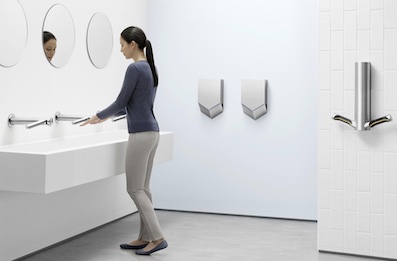 Cleanzine: your weekly cleaning and hygiene industry newsletter 26th June 2025 Issue no. 1168
Cleanzine: your weekly cleaning and hygiene industry newsletter 26th June 2025 Issue no. 1168
Your industry news - first
The original and best - for over 20 years!
We strongly recommend viewing Cleanzine full size in your web browser. Click our masthead above to visit our website version.
Older technologies provide inadequate hygiene protection: 62% of people concerned about visiting a public washroom
 A new study from Dyson for Business, conducted in July 2021 across 20 countries worldwide, has revealed that the public are still concerned about visiting public washrooms, often due to poor hygiene standards.
A new study from Dyson for Business, conducted in July 2021 across 20 countries worldwide, has revealed that the public are still concerned about visiting public washrooms, often due to poor hygiene standards.
One of the main drivers of this is inadequate technology solutions when it comes to hand drying. It is often conventional evaporative hand dryers that cause this concern, and the study found that it could be avoided with an alternative choice of machine.
When asked about the biggest concerns when using a hand dryer, 24% are still concerned about drying hands with unclean air and 40% worry about having to press physical buttons - nine percentage points down compared to last year. Technology solutions can negate these concerns: the inclusion of air-cleaning filters, a feature that 39% of respondents were reassured by, ensures hands are dried with clean air, and touchless technology, which would reassure 59% of respondents, are both Dyson standards.
In Dyson's 2020 study, 86% of respondents said they were washing their hands with soap and water five or more times a day, with the majority washing hands eight or more times per day, since the pandemic started. In 2021, the percentage washing five or more times per day dropped to just 75%.
62% of respondents, however, said they were more concerned about visiting a public washroom in July 2021 than they were the previous year. There are many possibly explanations for this, including, but not limited to, the easing or increased disregard for measures like masks.
Despite the uplift in public education campaigns focused on health & hygiene throughout the pandemic, one in three (33%) claim they dry their hands for hygiene reasons, with many drying hands for convenience or just doing it out of habit. This number represents a decrease vs 2020, when 45% of respondents dried their hands for hygiene purposes.
"These results highlight the need for further education on hand hygiene," argues Dr Salome Giao, senior microbiologist and scientist at Dyson. "We know damp hands can transfer up to 1000 times more bacteria than dry hands, while wiping hands on clothes can jeopardise the hand washing process, as they can add bacteria to the washed hands if they are not clean."
The survey covered 15,100 respondents in total, aged 18 years-old or above, in the following countries:
- UK n=2,000
- US n=1,000
- Australia (AU) n=500
- Canada (CAN) n=500
- Germany (DE) n=1,000
- Spain (SP) n=500
- France (FR) n=1,000
- Italy (IT) n=500
- Netherlands (NL) n=600
- Mexico (MEX) n=500
- China (CN) n=1,000
- Japan (JP) n=500
- Malaysia (MY) n=500
- Singapore (SG) n=2,000
- Taiwan (TW) n=500
- Hong Kong (HK) n=500
- India (IN) n=500
- Turkey (TR) n=500
- United Arab Emirates (UAE) n=500
- Belgium (BE) n=500
Dyson is a global research and technology company with engineering, research, development, manufacturing and testing operations in Singapore, the UK, Malaysia, Japan, the US, Mexico, China and the Philippines. Having started in a coach house in the UK, Dyson has consistently grown since it was established in 1993. Today, it has a global headquarters in Singapore and two technology campuses in the UK spanning over 800 acres in Malmesbury and Hullavington, alongside 10 engineering and research hubs around the world. Dyson remains family-owned and employs over 13,000 people globally including 6,000 engineers and scientists. It sells products in 84 markets internationally in over 340 Dyson Demo stores, as well as online through pioneering digital tools and virtual experiences.
Dyson is investing £2.75bn in the business to conceive revolutionary products and technologies. Dyson has global teams of engineers, scientists and software developers focused on the development of solid-state battery cells, high-speed electric digital motors, sensing and vision systems, robotics, machine learning technologies and A.I. investment. Since inventing the first cyclonic bagless vacuum cleaner - DC01- in 1993, Dyson has created problem solving technologies for haircare, air purification, robotics, lighting and hand drying.
The Dyson Institute of Engineering and Technology is a new model for engineering education combining the academic rigour of a traditional university with hands-on and real-world experience of working on real products and technologies inside a global technology company. Dyson undergraduates are paid a salary from day one and pay no tuition fees.
The James Dyson Foundation was founded in 2002 and the charity works internationally to empower aspiring engineers, support engineering in education and invest in medical research and has donated over £135m to charitable causes to date. The James Dyson Award is the Foundation's annual international design competition and is open to current and recent design and engineering students. Since starting in 2005, the Award has supported nearly 250 inventions, providing funds to support their commercialisation. 65% of international winners have successfully commercialised their projects, against a backdrop where 90% of start-ups fail.
17th February 2022







